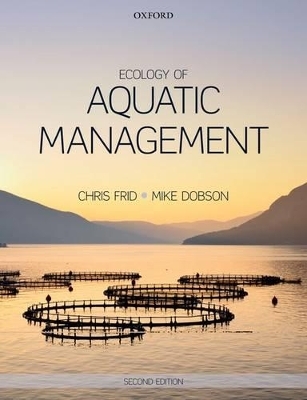
Ecology of Aquatic Management
Oxford University Press (Verlag)
978-0-19-969329-0 (ISBN)
Marine and freshwater systems are being placed under pressure like never before. A bigger and more demanding human population has meant increased utilisation of aquatic systems and, as such, the need for sustainable solutions to allow the development and conservation of these systems has become an international priority. In order to understand the limits of exploitation, an understanding is needed of the ecological principles that constrain levels of productivity and the systems' responses to exploitation pressure.
This timely book explores current exploitation practices, and the ecological basis and consequences of that exploitation. From a consideration of the ecological effects of the extraction of non-living resources, including energy and water itself, it progresses to the biology and ecology of aquatic organisms, and how these underpin the harvesting for aquatic resources. A discussion of the ecological consequences for the system of its use as a means of transport and as a repository for wastes follows, along with the increasing importance of aquatic systems for human recreational pursuits. Finally, effective management strategies for natural hazards, the provision of ecological goods and services, and restoration of aquatic systems are considered, as well as the importance of ecological science in exploitation management.
The role of science in providing an understanding of the effects of human intervention in aquatic systems is emphasised throughout, along with a consideration of the role of ecology in the sustainable management of the consequences of human activity.
Online Resource Centre
The Online Resource Centre to accompany Ecology of Aquatic Management features:
For students:
· Library of web links, giving students quick access to a range of additional resources
· Topical updates - surveys of key developments in the field
For lecturers:
· Figures
Chris Frid is professor of marine biology at the University of Liverpool and Head of the School of Environmental Science. He was responsible for development of the University of Liverpool's undergraduate degree in Marine Biology and has been jointly responsible for the development of the MSc in Marine Planning and Management. He teaches on marine ecology and ecosystem management. He has published over 85 refereed research papers, many of which deal with pollution (heavy metals, solid wastes, sewage, endocrine disrupters) or human impacts (ecosystem effects of fishing, recreational visitor pressure). He is a UK representative on the ICES Working Group on the Ecosystem Effects of Fishing, a member of the Defra Marine Fisheries Scientific Advisory Committee and an associate editor of the Journal of Applied Ecology. Mike Dobson is Director of the Freshwater Biological Association (FBA). His research centres on the ecology and management of rivers and wetlands, in both temperate and tropical environments, with particular emphasis on land use impacts such as forestry. He is the author of over 50 refereed research papers and has contributed invited chapters to six books. He is a member of the Rivers Biodiversity Integration Group for England, and represents both the FBA and the Society of Biology on the NERC Skills Review. Prior to his current post, he had fifteen years' experience in teaching ecology and aquatic management at undergraduate and postgraduate level. He is a Fellow of the Linnean Society of London.
PART ONE: WATER AS A RESOURCE; PART TWO: AQUATIC BIOTA AS RESOURCES; PART THREE: AQUATIC ENVIRONMENTS AS RESOURCES; PART FOUR: AQUATIC ENVIRONMENTAL MANAGEMENT
| Erscheint lt. Verlag | 13.6.2013 |
|---|---|
| Zusatzinfo | 200 line illustrations and photographs |
| Verlagsort | Oxford |
| Sprache | englisch |
| Maße | 190 x 244 mm |
| Gewicht | 680 g |
| Themenwelt | Naturwissenschaften ► Biologie ► Botanik |
| Naturwissenschaften ► Biologie ► Limnologie / Meeresbiologie | |
| Naturwissenschaften ► Biologie ► Ökologie / Naturschutz | |
| Naturwissenschaften ► Biologie ► Zoologie | |
| ISBN-10 | 0-19-969329-3 / 0199693293 |
| ISBN-13 | 978-0-19-969329-0 / 9780199693290 |
| Zustand | Neuware |
| Haben Sie eine Frage zum Produkt? |
aus dem Bereich


